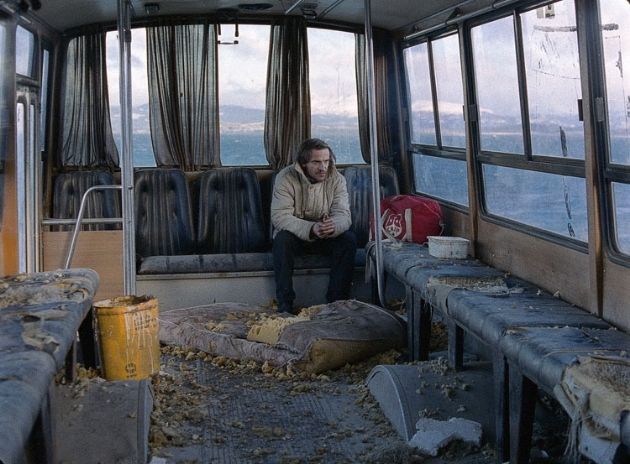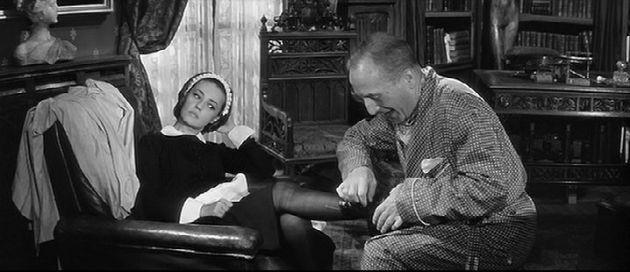Rendez-vous with French Cinema, a co-presentation of Film Society of Lincoln Center and Unifrance Films, has become a de facto film festival for francophiles over the years. A showcase of contemporary French cinema, this year's lineup includes 22 features and four short films making their New York, U.S., or North American premieres.
Celebrating its 20th year, Rendez-vous opens with Benoit Jacquot (
Farewell My Queen)'s
3 Hearts, starring Charlotte Gainsbourg, Chiara Mastroianni and Catherine Deneuve and closes with Quentin Dupieux (
Rubber)'s new film
Reality. The returning notable directors include - Jacquot, André Téchiné, Cedric Kahn, Jean-Paul Civeyrac and Christophe Honoré. The ever-diverse lineup includes gritty policiers (
The Connection,
Next Time I'll Aim for the Heart,
SK1), comedies (
Gaby Baby Doll,
Reality) and several films starring Catherine Deneuve (well, duh!). Shedding a spotlight on women filmmakers, the festival showcases 4 shorts by emerging women directors as well.
Rendez-vous with French Cinema runs March 6 - 15, in three different venues throughout New York-
FSLC,
BAM Cinematek and
IFC Center. Please click on each venue for details.
Being a francophile myself, the festival is always a treasure trove every year. I always find a couple of gems that end up on my year end top 20 films list from Rendez-vous without fail. These are the films I was able to see this year:
METAMORPHOSES
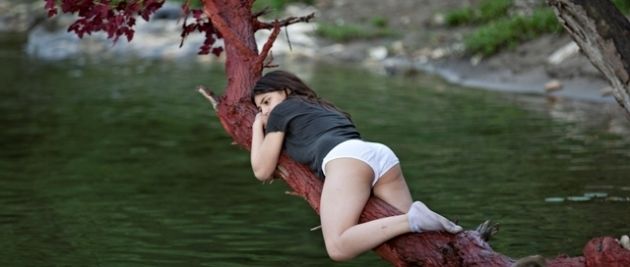
What fun! Honoré's interpretation of Roman poet Ovid's Greek mythic tale of gods and demigods starts out with a modern day hunter running into a flame haired nude transgender person who graces him with pixie dust and turns him into a deer. The hunter becomes the hunted. Filled with young nude bodies (usually full frontal),
Metamorphoses tells a high school girl Europa being kidnapped by Jupiter in the form of a hunky, bearded truck driver. It's a sexual, spritual awakening for Europa, as she mingles with Jupiter, Bacchus and Orpheus. Story within a story within a story plays out, some funny, some dark but all enjoyable, with emphasis on sexual ambiguity and transformation in human beings. The film is like a dream of a horny teenager who has fallen asleep in literature class.
A couple of years back, I remember Honoré telling me when I interviewed him for his film
Beloved, that he is not a type of director who'd want to make nice things to be remembered by his offspring. He'd rather make things his son would be ashamed of. Without any big name actors, he charges on bravely, with lots of raunchy images, tackling on today's rigid, conservative society with an ancient literature and reminds us that things were much more transgressive and transforming in 1 century B.C..
Metamorphoses is also a visual feast, not only because of all the young nudes, but also the under-water scene where Orpheus attempts to retrieve Eurydice from the underworld which is breathtakingly gorgeous. There are many idyllic nature settings, most of them near the water which is the running theme of the film.
Death of skateboarding Narcissus scene is an epitome/origin of many Honoré's love sick characters' demises, you find out. Playful, dirty, edgy and wondrous in its micro-economic way,
Metamorphoses works as it is intended to- a beautiful, dreamy poetry in accordance with the spirit of French New Wave. One of my favorites from the festival.
3 HEARTS **Opening Night Film
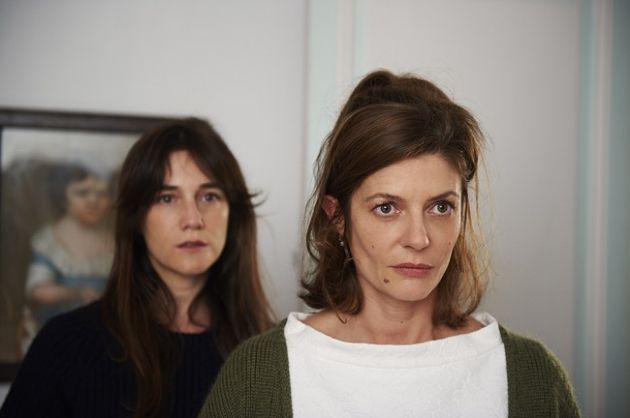
Marc (Benoit Poelvoorde), a shlumpy tax investigator, just missed the train back to Paris. He meets and chats up lovely Sylvie (Charlotte Gainsbourg) who seems a little troubled. They walk all night talking. In the morning, they promise each other, without exchanging the numbers, to meet in Paris in one week on Friday, near a famous fountain near the park. The encounter was so special, Sylvie decides not to move to the US with her current boyfriend as she's been planning. But the Friday comes and goes. Marc misses the rendez-vous because he gets delayed by clients and has a mini stroke from his stressful job. Heartbroken Sylvie leaves for the US with her boyfriend.
Marc is in town again, looking for Sylvie. He ends up helping out distraught Sophie (Chiara Mastroianni), Sylvie's sister, with her business tax problems. The romance blooms. Eventually Marc finds out that they are very close siblings and whatever reason, he decides to avoid contacting Sylvie. Marc and Sophie marry. Marc and Sylvie avoid each other at the wedding. 3 years passes. The couple has an adorable son now. For the 60th birthday of the mother (Catherine Deneuve) of the sisters, Sylvie comes home. She and her boyfriend is not doing well and Marc and Sylvie's passion rekindles.
Not quite 'what if" story but
3 Hearts is full of regret and melancholy. It's a fluff in the vein of old Hollywood but with the help of todays gadgets - skype and cell phones, it works as a tension filled love triangle. You don't really believe two of the most alluring actresses of our time would fall for Poelvoorde's Marc, but whatever. It's a fun movie.
Director Benoit Jacquot has been busy. His new film
Diary of a Chambermaid, a remake (of Renoir's classic in 1946, then again 1964 by Buñuel), starring Lea Seydoux just debuted at this year's Berlinale.
MAY ALLAH BLESS FRANCE
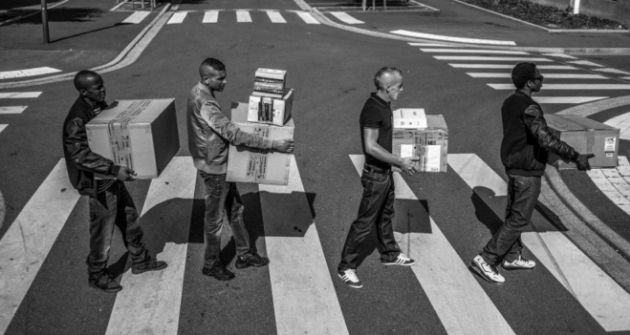
In light of Charlie Hebdo massacre, Congolese born French rap artist Abd Al Malik adapts his own autobiographical book
Qu'Allah bénisse la France and shows yet another side of Muslims in France. Charismatic, clear eyed Marc Zinga portrays the rapper who was raised in a housing project of Neuhof, a surburb of Strasbourg. In the film, Al Malik (Zinga), whose given name was Régis before he converted to Sufi Islam, is a gifted student in Literature and destined to become a philosopher/poet. But his real passion is rap music and wants to overcome his underprivileged background and become a big star. With some of his friends, he practices and writes songs 2-3 hours at a time at a local community center where they have limited access to the gear and space. They pickpocket tourists to raise the dough but avoids dealing hard drugs unlike many of his friends and neighbors who are now incarcerated or dead.
It's neighbor's daughter Nawel (Sabrina Ouazani) who introduces him to Sufism, the spiritual side of Islam, and teaches him not to be a foreigner in their own country. Love blooms between them.
In
May Allah Bless France, being Muslim is considered as an added responsibility that young people put on themselves. This means no drinking, no drugs, no disrespect towards women. The film's quite different from what you expect from the usual gansta movies. Al Malik restrains himself (to a fault) from going bombastic in style. It's shot in monochrome but the similarity with Mathieu Kasovitz's breakthrough 1995 urban drama
La Haine ends there. The film almost too sanitized. The act of drive by shooting is never shown, Nawel and Régis never even kiss or show their affection out in the open until their eventual marriage. Sure some bad things happen to his friends and family members but everything is way too clean to be even a little bit affecting. Music is good though, especially Nina Simone sampled
Gibraltar and
Soldat de Plomb. Mireille Perrier (
Chocolat,
Boy Meets Girl) shows up as his school mentor, reminding him the past choice doesn't matter, it's the future ones that counts.
GABY BABY DOLL
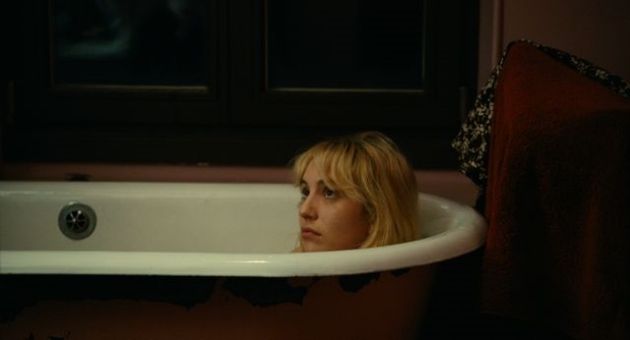
Gaby (Lolita Chammah) is told by her doctor that she needs to learn how to be independent/self-sufficient. That she needs to let her neurosis go and get some much needed rest. So she arrives in a picaresque rural village with a group of friends. It's supposed to be a rustic vacation at a big house that belongs to her doctor. The trouble begins after her friends leave and her boyfriend detects that she doesn't really love him. So he leaves too, declaring that he will come back after the leaves on the tree in the front yard falls. Now left all alone by herself, she needs to find somebody to keep her company. She resort to a group of men in a local tavern every night to walk her home and stay the night, one by one. It's not like she wants to sleep with them, but she can't bear the thought of being alone. The words go around and she is banned from entering the pub ever again.
Then there is Nicolas (Benjamin Biolay), a bearded hermit who lives in an impossibly tiny shack with a friendly dog, outside of an abandoned castle. He is supposed to be the caretaker of the place. He has his set routine - long walks every morning and evening, collecting his thoughts, reflecting on life. He is a total opposite of Gaby. And she clings to him like a leech for company. Soon they are off to walk together and slowly, he teaches her to enjoy the solitude, just a little bit.
Sophie Letourneur's idiosyncratic romantic comedy rides heavily on the charm of baby-faced Chammah and she totally delivers. I get the Greta Gerwig comparisons but
Gaby Baby Doll's success also has got to do with Letourneur's writing- nonchalant characters, unusual sense of humor.
PORTRAIT OF THE ARTIST
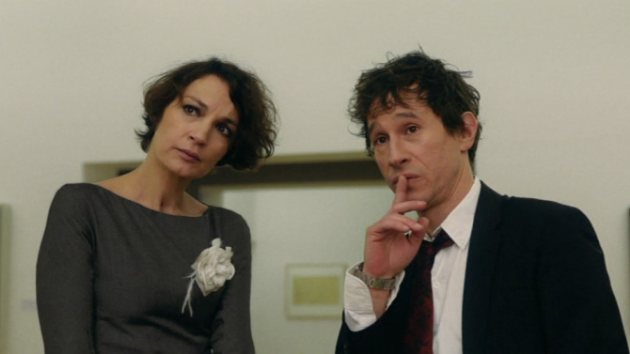
Director Bertrand Bonello (
House of Tolerance,
Saint Laurent) plays Bertrand, a film director who's trying to find one inspirational piece of art for his upcoming film about monstrosity. His supportive producer (Valerie Dreville) introduces him an art historian friend Célia (played alternately by Jeanne Balivar and Geraldine Pailhas) to help out finding an inspiration in various art museum trips. They see the paintings of Bacon, Caravaggio, Baltus, etc. Without any written dialog and clear direction, Bertrand is having a hard time explaining the project to his actors (Pascale Greggory, Sigrid Bouaziz). He also has a lot on his mind - his retrospective is coming up, a young, inarticulate interviewer keeps bothering him to meet up, Bertrand's stage actress/singer wife Barbe (Joanna Preiss of
Siberie) is always on the road, mysterious Célia keeps changing her appearances while flirting with him. Then there is large red welts on his back that keeps getting bigger. Is it a sign of psychosomatic symptom or is it some kind of metaphor?
Director Antoine Barraud is not in a hurry to rush us out of the museums. He takes time for us to look at each of the painting Bertrand and Célia are looking at. And we observe them while they observe art in a quiet setting.
Portrait of the Artist is filled with beautifully photographed images and attractive actors (including Bonello, who wears sad, intelligent face very comfortably and has a strong screen presence). The film is not too concerned about one's artistic process or the end game. There is a pervading comfortable nonchalance: not silly but sophisticated and arresting. Even though it's not a puzzle piece, there are hints throughout the film that all the people surrounding Bertrand are reflections of himself - silly, shy, seductive, strange... that these are the overactive imagination of an artist. If a good cinema is nothing but the art of seduction,
Portrait of the Artist would be it.
MY FRIEND VICTORIA
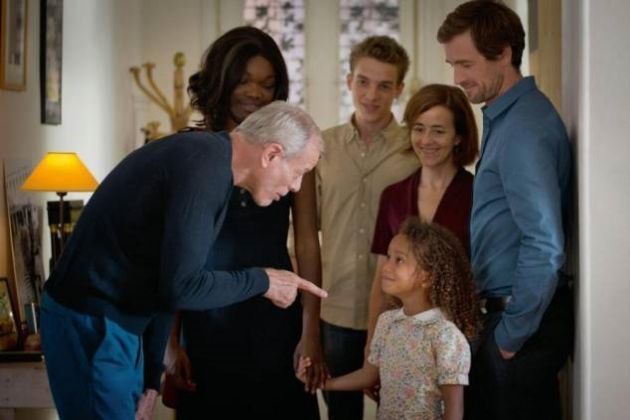
Jean-Paul Civeyrac's adapts Doris Lessing's novella,
Victoria and the Staveneys. Narrated by her lifelong friend Fanny, the film chronicles passive life of a black girl.
Victoria, a girl growing up in the project, gets to experience how the wealthy white family (the Savinets) lives for one night when she was 8. The night and the handsome and gentle older son Edouard of the family make a lasting impression on her life. Later, she has a fling with the younger Savinet, Thomas, gets pregnant and decides to keep the child without telling him. She takes various low paying jobs because of lack of education, falls in love, raises two children by herself. Now her mixed daughter Marie is 7. Because Victoria doesn't want her daughter to end up like herself, she decides to contact the Savinets to reveal the truth. The whole Savinets are ecstatic except for Edouard, who asks for paternity test but then immediately regrets his decision. Being ultra liberal, the Savinets are crazy about this 'caramel colored girl' and pours all their affection to her. They even debate about if affection need to be shared by Victoria's other child, Charlie, by another father.
I loved Civeyrac's
Through the Forest, part love story, part super-natual thriller, part musical. His light touch and technical daring do (
Forest is consisted of 9 uncut, long shots). Here, he skillfully drives the film without making it all a case study for social observation. His filmmaking is fluid and light. Victoria is a beautiful character, trying to do right by her family and herself. Guslagie Malanga is terrific as the older Victoria, so as the narrator Fanny, played by Nadia Moussa and so as the Savinets, especially the warm, artistic dad and mom (Pascal Greggory and Catherine Mouchet).
It's interesting to see a film that shows as much about how well-to-do white liberals deal with minorities as about minorities themselves. It's an interesting window to see the race relations in post-Sarkosy, pre-Charlie Hebdo era France.
IN THE NAME OF MY DAUGHTER

André Téchiné, the French master of subtle psychological dramas, tackles real life intrigue that took place in the French Riviera in the 70s. It is the esteemed director and Catherine Deneuve's 7th collaboration to date.
Deneuve plays Renée, a widow and owner of the last remaining casino that is not taken over by mafia. She is aided by her loyal lawyer Maurice (Guillaume Canet, respresenting two films at this year's Rendez-vous) to tread the troubling times. It's Maurice's cunning political maneuvering that makes Renée to take total control over the casino. But her daughter Agnes (Adèle Haenel,
Water Lilies and this year's Cesar Award winner for Best Actress for
Love at First Fight) arrives, expecting to cash in on her inheritance and set up a little business for herself. Athletic, sultry Agnes slowly but surely falls for studious Maurice who is married and also has a string of mistresses.
After getting rejected by Renée for advancement, Maurice, along with Agnes arranges for ousting of Renée from the leadership of the casino. Lovesick Agnes becomes completely dependent on him. But he tells her that he can never reciprocate the love she has for him. She becomes suicidal and one day disappears without a trace. Soon after, Maurice transfers all of Agnes's money to his account. Twenty years later, Maurice is flown back to France from South America where he lives now, to stand for the trial, accused of the murder and disappearance of Agnes, brought on by diligent work of Renée.
Building suspense or clear resolution is not what Téchiné's after. Despite its terrible American title (its original title is
L'homme qu'on aimait trop which means 'The Man Who Loved Too Much' which makes much more sense in the film's context), the film is yet another great example of Téchiné's astute examination of unpredictability/duplicity in human nature that he is known for. All three principal actors are terrific against beautiful French Riviera setting, shot energetically by a veteran cinematographer Julien Hirsch (
3 Hearts,
Bird People, Godard's
In Praise of Love and
Notre Musique as well as Téchiné's
Unforgivable and
The Girl on the Train), the film is another strong outing from Téchiné.
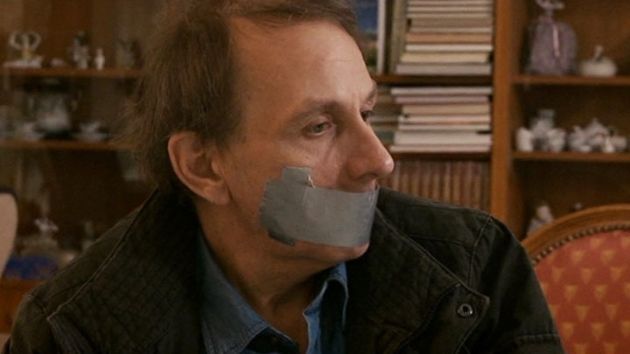
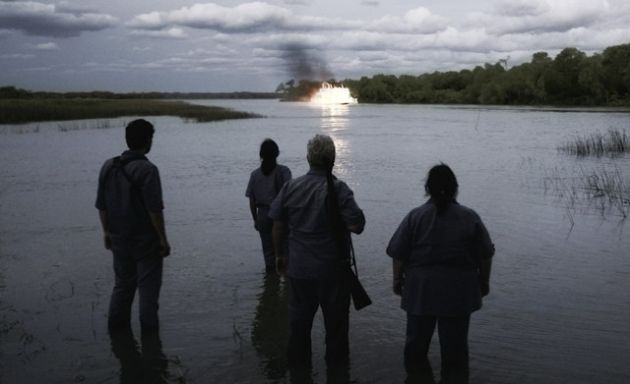
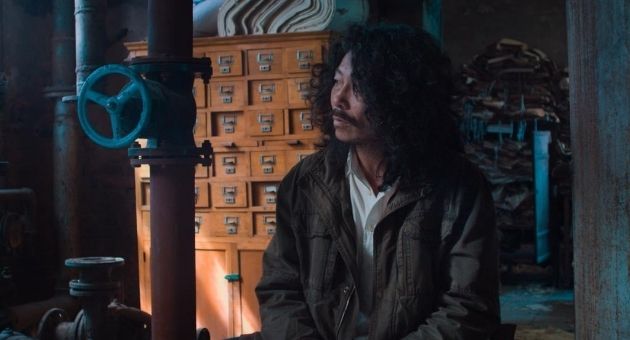
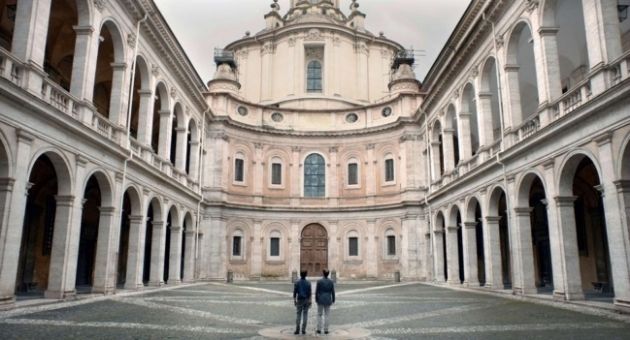
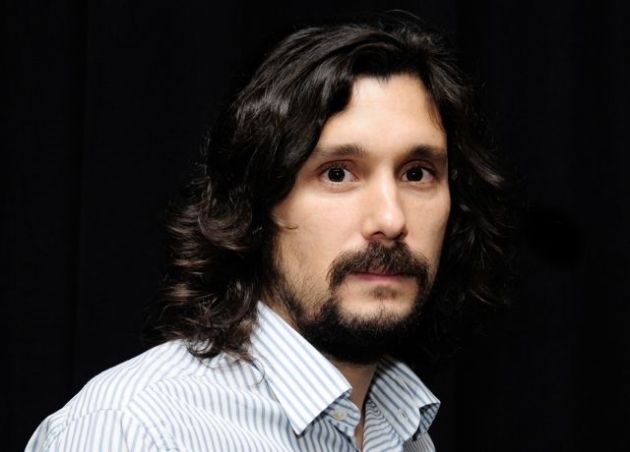
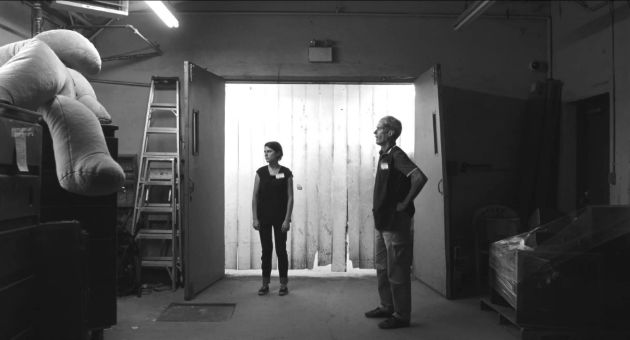
 Beautifully shot in contrasty black and white by Sara Mishara, Tu dors Nicole is especially gorgeous in exterior night scenes: as an insomniac, Nicole partakes in nighttime baseball game, standing under the park lamp dazed, while the ball drops to the ground near her. She walks around at night in the neighborhood which are only illuminated by street lamps. She hears whale songs in the night winds and hitches a ride, driven by a tired father driving in circles in the hopes of putting his baby in the backseat to sleep.
Beautifully shot in contrasty black and white by Sara Mishara, Tu dors Nicole is especially gorgeous in exterior night scenes: as an insomniac, Nicole partakes in nighttime baseball game, standing under the park lamp dazed, while the ball drops to the ground near her. She walks around at night in the neighborhood which are only illuminated by street lamps. She hears whale songs in the night winds and hitches a ride, driven by a tired father driving in circles in the hopes of putting his baby in the backseat to sleep.